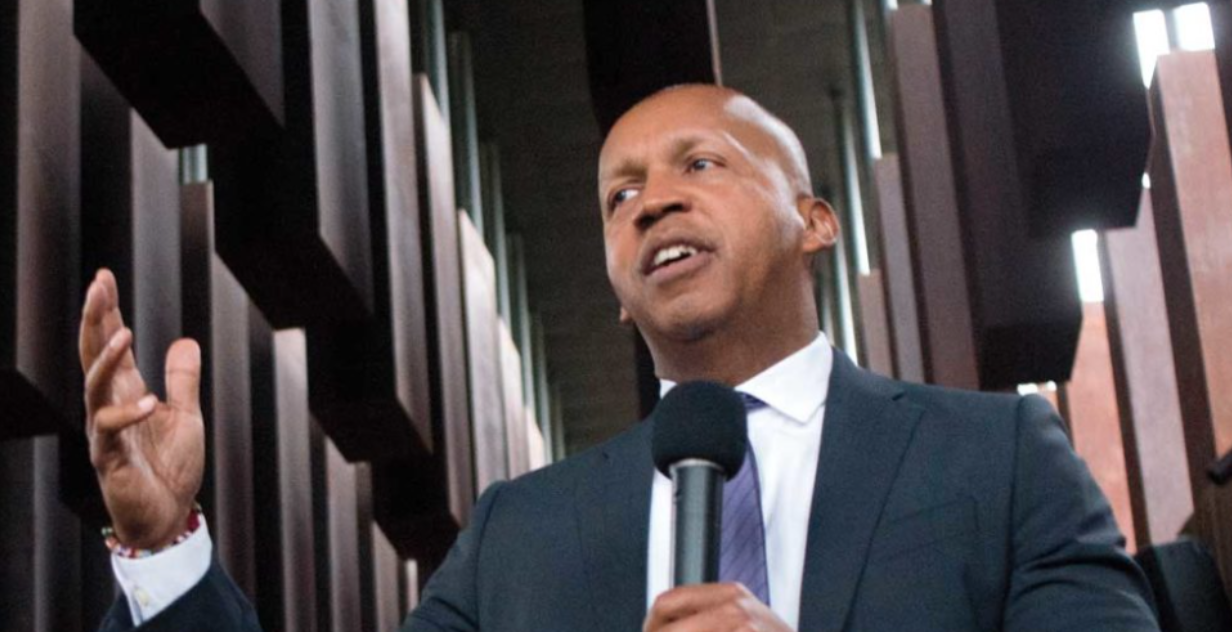The Christian Theological Seminary in Indianapolis hosted a discussion on Oct. 5 led by Bryan Stevenson, a lawyer and advocate for racial justice. Photo courtesy of the Equal Justice Initiative.
LEAH OLLIE | STAFF REPORTER | lollie@butler.edu
On Oct. 5, the Butler community welcomed Bryan Stevenson for a presentation and guided discussion about poverty, societal injustice and intersectionality. This conversation also maintained a local focus, leading attendees to formulate solutions to the complex problem of poverty in Indiana and serve the community around them.
The event had already sold out days before Stevenson’s appearance, but free tickets were available for multiple weeks in advance. This discussion was sponsored by the Christian Theological Seminary’s Faith and Action Project and hosted at Clowes Memorial Hall on campus.
On Sept. 30, Butler’s Desmond Tutu Peace Lab hosted a screening and discussion of the documentary “True Justice: Bryan Stevenson’s Fight for Equality,” originally aired on HBO. This screening primed attendees for Stevenson’s discussion with a more comprehensive knowledge of his accomplishments.
Madelin Snider, Peace Lab intern and junior art and design major, feels that Stevenson’s work represents The Desmond Tutu Peace Lab at its core.
“When I speak about disability rights in the Peace Lab, I think of Stevenson’s work [as] surrounding how unfairly disabled people are treated within a lot of systems that exist in the U.S.,” Snider said in a message to The Butler Collegian.
Snider believes that intersectionality as taught by the Peace Lab and Stevenson is relevant to determining peace and equity.
“I think having Bryan Stevenson come and talk about his experiences working with people who have received inhumane punishments relates to a lot of the kinds of problems the Peace Lab deals with, and determining if there are more fair and peaceful ways to do things,” Snider said in a message.
As founder and current executive director of the Equal Justice Initiative, or EJI, Stevenson utilized his legal practice to aid wrongfully incarcerated prisoners, primarily those on death row. The Equal Justice Initiative’s areas of reach expanded to racial injustice and public education efforts, disseminating many reports and resources regarding racial terrorism — terror with racial motivation — and inequity in today’s prison systems. One notable resource is a year-round wall calendar available for internet access or print purchase; each day is accompanied by an occasion of historical racial terrorism or discrimination, to remind buyers of the legacy of racial trauma that the U.S. carries.
First year biochemistry major Brynn Baker thinks that this work EJI has done is imperative to this generation, and she found Stevenson’s book “Just Mercy” informative.
“I think Bryan Stevenson will be a name to remember for this generation. He’s such an inspiring and eloquent person,” Baker said. “I was gobsmacked by the contents of ‘Just Mercy.’ After reading it a while ago, I knew I had to learn more about what Stevenson had to say.”
Two EJI sites in Montgomery, Alabama are currently open to the public; the first is the new Legacy Museum, the other is the National Memorial for Peace and Justice. The latter, featured in the “True Justice” documentary, is the nations first memorial to victims of lynching and racial terrorism in the U.S. Over 800 steel sculptures stand on the Memorial grounds, one for each county in which a lynching has occurred historically. EJI also helps to build and restore lynching memorials offsite in other counties to instill dialogues of racial healing and community.

This statue at the EJI’s National Memorial for Peace and Justice in Montgomery, AL depicts the historical struggle of Black Americans. Photo courtesy of the Equal Justice Initiative.
Dr. Peter Wang, lecturer of art history with the Jordan College of the Arts and Faculty Fellow with the Desmond Tutu Peace Lab, acknowledges the significance of Stevenson’s historical work in relation to issues that occur today.
“You will still see these issues of mass incarceration and lynching history here and there across the country; that is why it’s really important for us to encounter them,” Wang said.
He also emphasized that education and awareness are essential to moving forward in action.
“One of the students [at the documentary screening] shared a quote: ‘Knowing is not experiencing;’ I echo and respond in saying that the worst thing that can happen is not knowing,” Wang said. “The Desmond Tutu Peace Lab is trying to advocate and educate, especially towards students, faculty and staff in the community here at Butler. Maybe at some point we can be on the right side of this and help change our community.”
These efforts are reflected by the implementation of the inaugural Visiting Black Intellectual program, which began with Ian Manuel’s presence on campus on Sept. 22. Manuel, whose story and work is closely intertwined with Stevenson’s, shared his insights on poetry writing, legal justice and childhood incarceration after 26 years in prison. These perspectives fulfill Wang’s idea of “knowing” not being equivalent to “experiencing” and establish a standard of platforming individuals who bring lived experiences to the table.
All Bulldogs have something to learn from intellectuals and inmates alike.



